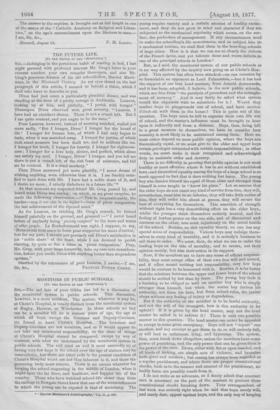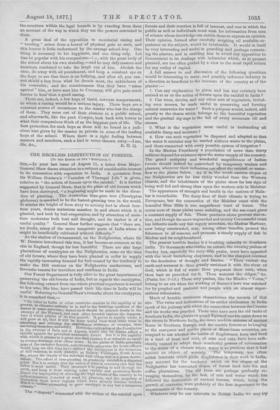MONITORS IN PUBLIC SCHOOLS.
[To TER EDITOR OF TER “SPEOTATOR.1 SIR,—The sad fate of poor Gibbs has led to a discussion of the monitorial system in public schools. This discussion, however, is a mere accident. The system, 'whatever it may be, at Christ's Hospital, is totally distinct from the monitorial system at Rugby, Harrow, or Winchester. In these schools no boy can be a monitor till he is sixteen years of age, the age at which all boys, except the Grecians and Deputy-Grecians, are forced to leave Christ's Hospital. The Grecians and Deputy-Grecians are not monitors, and as it would appear do not take any monitorial responsibility, so the state of things at Christ's Hospital cannot be compared, except by way of contrast, with what we understand by the monitorial system in public schools. The evil (and an evil it most assuredly is) of having very few boys in the school over the age of sixteen may be unavoidable, but there are other evils in the present condition of Christ's Hospital which are not thus inherent in it, sad these the governing body must remove. There is no excuse whatever for keeping the school stagnating in the middle of London, when it might have the far freer, and healthier, and happier life of the country. Those who have watched school-life closer than from the railings in Newgate Street know that one of the worstinfluences to which the young can be exposed is that of monotony. The * Harriet Martineau'. Autobiography," vol. IL, p. OS. young require variety and a certain amount of healthy excite- ment, and they do not grow in mind and character if they are subjected to the mechanical regularity which seems, on the sur- face, the perfection of management. If any circumstances tend to make the schoolboy's life monotonous, and to subject him to a mechanical routine, we shall find them in the boarding-schools of large cities. How is it that we can see so clearly the defects. of the French ?yam, and yet tolerate these and worse defects in one of the principal schools in London ?
But, as I said, the monitorial system of our public schools is in no way affected by the inquiry now going on at Christ's Hos- pital. This system has often been attacked—on one occasion by- so formidable an opponent as Lord Palmerston,—but it has had the support of our best headmasters, from Arnold downwards,. and it has been adopted, I believe, in the new public schools!, which are free from " the paralysis of precedent and the entangle- ment of memory." And it may fairly be asked what system would the objectors wish to substitute for it ? Would they confine boys to playgrounds out of school, and have maitres d'etude sit with them in the house ? This is quite out of the question. The boys must be left to organise their own life out- of school, and the master's influence must be brought to bear upon it indirectly and from a distance. Boys, then, being left in a great measure to themselves, we have to consider how morality is most likely to be maintained among them. Here we must either depend on mere public opinion, where the boys are theoretically equal, or we must give to the older and upper boys certain privileges connected with certain responsibilities ; in other words, we must make it their recognised and acknowledged duty to maintain order and decency.
There is no difficulty in proving that public opinion is not most healthy or most effective where it has to act without established laws ; and theoretical equality among the boys of a large school is so, much opposed to fact that it does nothing but harm. The young boy who fancies himself the equal of those older and stronger than himself is soon taught to "know his place." Let us assume that the elder boys do not exact any kind of service from him, they will, nevertheless, treat him as an inferior, they will take little notice of him, they will order him about at games, they will secure the best of everything for themselves. This assertion of strength without right has a very demoralising effect on the elder boys,. whilst the younger think themselves unfairly treated, and the feeling of lawless power on the one side, and of discontent and soreness on the other, acts most injuriously on the moral health of the school, Besides, on this equality theory, no one has any special sense of responsibility. Vicious boys may indulge them- selves; in every kind of brutality, and it is nobody's business to' call them to order. We must, then, do what we can to enlist the leading boys on the side of morality, and to secure, not their opinion merely, but also their action in its support.
Now, if the monitors are to have any sense of official responsi- bility, they must accept office of their own free will and accord, and if office meant nothing but responsibility, very few boys would be anxious to be honoured with it. Besides, it is far better that the relations between the upper and lower boys of the school should be settled by law than by force. The young boy feels it a hardship to be obliged to wait on another boy who is simply stronger than himself, but when the senior boy derives his authority, not from his fists, but from school-rules, the junior obeys without any feeling of injury or degradation.
But if the authority of the monitor is to be lawful authority,. and not the will of the strongest, how is this authority to be upheld? If it is given by the head master, may not the head master be called in to enforce it? There is only one possible answer to this question. The head master can never be appealed to except in some great emergency. Boys will not " report" one another, and any attempt to get them to do so will entirely fail, or will lead to unfairness, lying, and hypocrisy. '['he system, then, must break down altogether, unless the monitors have some power of punishing, and the only power that can be given them is• the power of the cane. Blows, either with fist or open-handed, and all kinds of kicking, aro simple acts of violence, and brutalise both giver and receiver ; but caning has always been regarded as a regular punishment, and where there are proper constitutional, checks, both as to the manner and amount of the punishment, no. bodily harm can possibly result from it.
I do not write as an advocate, so I freely admit that constant care is necessary on the part of the masters to prevent these constitutional checks breaking down. Your correspondent of last week was entirely right when he said that boys rarely will,. and rarely dare, appeal against boys, and the only way of keeping
the monitors within the legal bounds is by exacting from them an account of the way in which they use the powers entrusted to them.
A great deal of the opposition to monitorial caning and " tunding " arises from a horror of physical pain as such, and this horror is little understood by the average school-boy. One thing is necessary to his happiness, and one thing only. Let him be popular with his companions—i. e., with the great body of the school about his own standing,—and he may defy masters and monitors combined to take the laugh out of him. Abolish the cane, do away with all punishment, and keep a constant eye on the boys to see that there is no bullying, and after all, you can- not shield a boy from what he dreads most, the unkindness of his comrades ; and the consciousness that they have "taken against" him, or have sent him to Coventry, will give pain much &ardor to bear than a good caning.
There are, indeed, a few boys of timid, nervous temperament, to whom a caning would be a serious injury. These boys are a constant source of uneasiness to the master who has the charge 'of them. They seem out of their element in a public school, and afterwards, like the poet Cowper, look back with horror to what their companions think of as the happiest part of life. The best protection for such boys as these will be found in a judi- cious hint given by the master in private to some of the leading boys of the school. Where there is a right feeling between masters and monitors, such a hint is never thrown away.—I am,



































 Previous page
Previous page